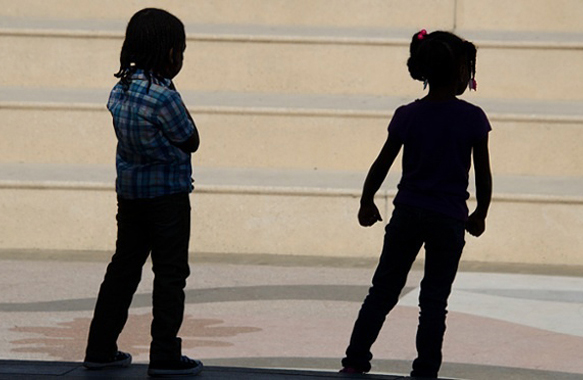By Rebecca Carroll | Originally Published at The Guardian and Observer.< March 17, 2015 11.15 EDT | Photographic Credit; I learned my racial identity as a child through the lens of racism. Photograph: Daniel Arauz/flickr
Your ‘not all white people’ argument doesn’t dismantle systematic racism. It only reinforces white privilege
I didn’t tell my white parents, who had adopted me and chose to raise me in an all-white town, because why would I? What would they know? How could they help? They thought the world was changing and they fought for all the right things, but we never talked about race, so I didn’t think to tell them when a teacher made sure I knew that being black made me less-than.
There’s a special kind of anxiety and rage and resentment that comes with discovering your racial identity through the default lens of racism, and without the support and refuge of a shared community vernacular. Folks who see you, recognize your skin, give length to your cultural narrative, exist under and within that space W.E.B. Du Bois wrote of, behind the veil.
Of course racism is more than just a fifth grade teacher devaluing me on the basis of race, or a boss in high school calling me a lazy n***er, or when a 21-year-old white frat boy gets caught gleefully participating in a racist chant. Racism is more than comments that hurt people’s feelings; its a system of power and convenience, the next level beyond cultivated privilege.
And yet, this country continues to mobilize around incidents of racist behavior and not against systemic racism, pushing public statements filled with shock and lip service to “diversity”, individual expulsions and university-wide disassociation. But naming, shaming and shunning individual racists – if it has any deterrent effect on other would-be racists at all, which seems increasingly doubtful in 2015 – doesn’t solve the systemic racism faced by black people in employment, in housing, in university admissions, in interactions with the judicial system and for the love of God, in the value of life.
All your heartfelt statements in the world about how individual racists are bad people doesn’t fix a system that continues to disprivilege people of color – but it does, though, make white people feel like they “did something” about racism. I’m not impressed.
The 9-year-old black girl who – up until she heard “pretty for a black girl” – had felt entitled to a life of equal opportunity and inclusivity through hard work, tenacity, skill and talent wants more than some public apology by another white person who’s benefitted from the racism that will inevitably, believe it, hold her back. This grown black woman who continues (not always successfully) to summon the emotional stamina to try to be “twice as good” every day wants to summon less and live more.
The child in me wants to witness white people feel that same visceral realization of ugliness because of her race. I’d like to see the physical manifestation of what should be their deep, psychological remorse, to watch as white people palpably absorb the guilt and fear – and more – that they have forced black Americans to endure for the past 150 years.
I don’t want another explanation that one white person’s racist, privileged behavior doesn’t reflect the thoughts and actions of all white people. It was never all black people, either, but black people have always been treated as if it were (and still are).
White people need to start actually seeing us and learning who we are, because we know a lot about you all. Recognize the histories we carry, the individual complexities we cultivate, and the culture-wide stampeded spirit we contain. Disabuse yourself of the notion that calling out a white person for racist behavior makes you less culpable or more enlightened, and instead reflect on why you don’t relate first to the black people being denigrated.
Rebecca Carroll is a Guardian US contributing opinion writer and the director of digital media and marketing at Scenarios USA. She is the author of several nonfiction books, including Saving The Race and Sugar In The Raw. Follow her on Twitter: @rebel19
Copyright; Guardian News and Media Limited,. Reprinted with permission.
This piece was reprinted by EmpathyEducates with permission or license. We thank Rebecca Carroll for her kindness and for inviting us to look at ourselves and the society we live in. We also wish to express our appreciation for The Guardian for being an enduring source of information and ideas.












Leave A Comment